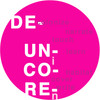Cracks on the Façade
The first part Looking for Cracks was written by de_colonialanguage collective, and the second part “ Power of Erotics” was written by Dr. Chang Gao.
All the western nations are caught in a lie, the lie of their pretended humanism: this means that their history has no moral justification, and that the West has no moral authority.
― James Baldwin, No Name in the Street
A person walking into a square in Berlin in 2024 and uttering the word “decoloniality” finds themselves in the following political landscape: German clubs (Süld, Fulda) sing the song “Deutschland den Deutschen, Ausländer raus” [Foreigners out, Germany for Germans], right-wing parties and politicians win European Parliament elections, an elderly woman passing by demands only German words on the fence of a square in Berlin and curses at migrants, Berlin’s mural artists demand conversations only in German and talk about the oppression of “native Germans”, and Germany as a whole has corrupted right of speech by Islamophobia.
Can art today do nice beautiful things? Can Fanon and Foucault wake up today and write odes to contemporary power relations? No. They can’t. They won’t wake up. They won’t write odes. Their texts now sound like a dystopian elegy to society. And to be able to hear this, it is enough just to stand in the center of Alexanderplatz for 30 minutes.
- Part 1. Looking for Cracks
- The Façade is a Screen
- ПРАВДА [pravda] / in GOD we TRUST
- Façade or Façades?
- Part 2. Power of Erotics
- Desire, AI, and Public Intimacy
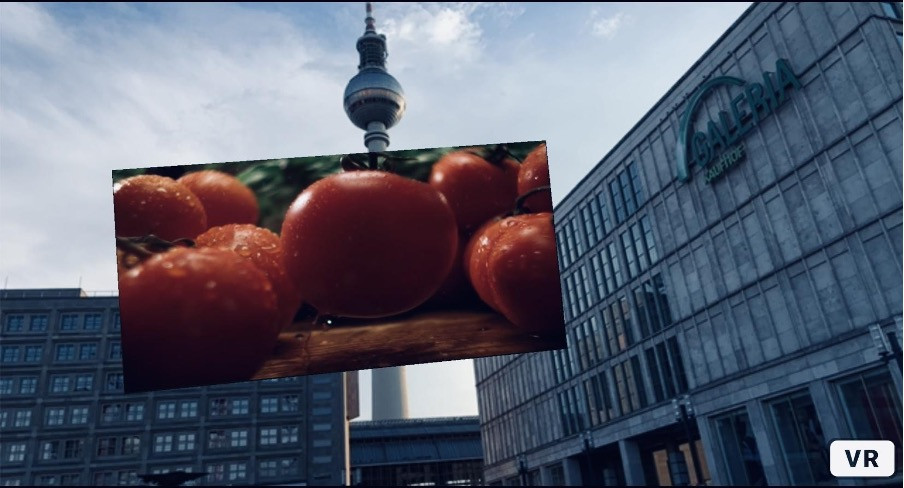
Part 1. Looking for Cracks
The Façade is a Screen
Modernist architecture in the late nineteenth and early twentieth centuries acquired such constructions and technologies that buildings no longer rested on walls but on internal structures. Thus the façade of a building became not a structural element but a decorative element. The façade often carried no load, but an ideological message, which could be “just” beauty. This phenomenon helps to view Russian-Soviet-Russian colonialism more accurately. Thanks to this architectural inspiration, it is possible to speak of façade postcolonialism and façade Marxism, systems that have used and continue to use positively colored ideologies for decorative purposes on the façades of their violent structures. While the very constructive elements of these structures are hidden within the systems, and they consist of patriarchal-colonial power relations. James Baldwin was convinced that Western “humanism” and “human values” are arranged in the same façade way. It is a case of hiding colonialism.
The communist allegedly anti-imperialist state of the USSR, which followed the testaments of Marx, Engels and Lenin, was just a modernist façade with socialist and communist ideas written with Soviet May Day font — big monochrome politically empty letters coopted/accepted by authorities. The structure of the political system of the USSR was based on ethnic, political, gender, colonial repressions. The power itself was in the hands of a small circle of patriarchal nomenklatura, which maybe wasn’t so different from the way power was distributed in cases of military juntas. A propaganda façade with the smell of Marx and the flavor of Lenin directed its communist-looking messages both outside the empire of the USSR and inward to the citizens and its colonized objects. Functionally, however, this structure is based on the deeply xenophobic, extractivist, broadly discriminatory practices of colonial relations.
![ПРАВДА [pravda] / in GOD we TRUST, installation de_colonialanguage collective in Open Air Museum of Decoloniality, May 2024, Berlin.](https://fastly.syg.ma/imgproxy/h6-iwWpIRZ68fjZFw96KNE2xFInhwToEiI7fPwb0UhE/rs:fit:::0/aHR0cHM6Ly9mYXN0bHkuc3lnLm1hL2F0dGFjaG1lbnRzL2MyMTNkYjBiMjg1YTA0ZGEyM2UzNmMyMDliYzU2ZWQ0MDE1MTMwM2Uvc3RvcmUvMzU5MTg3MjRhYzE3NjJlNWZlMThhNDEyOGVhOGM5MTBjZTBmYzg2ODA4MzVkYjNiYTU2ZmYyNjJlZDQ2L2ZpbGUuanBlZw)
The USSR was a place for over 100 nations and various ethnic groups, but most of the population of that collapsed empire spoke Russian. Where are the other 100+ languages? The language policy of the Marxist Soviet empire was such that the infrastructure (schools, labor, opportunities for self-realization, culture, etc.) was almost completely Russified. Soviet = Russian. The dominance of metropolitan monoculture instead of diversity. This is just one example of the colonial structure of power and culture under the Marxist mask with the slogan Дружба Народов [druzhba narodov] (eng. Friendship of Peoples) on it.
Die Arbeiter haben kein Vaterland [the workers have no fatherland] wrote Karl Marx and Friedrich Engels, while the Soviet façade-communist nomenklatura sang songs in the central voice of the central TV channel and central radio station -
Где начинается Родина если Мой адрес не дом и не улица, мой адрес Советский Союз!
[Where the Fatherland Begins if My Address is Not a House or a Street, My Address is the Soviet Union!]
Die Arbeiter haben kein Vaterland
Kein Vaterland
Kein Land
Labeling the USSR as a communist or socialist system is a serious misdirection. Rather, it is even a problem, because it is such a distorted image and practice of communist ideologies that the word “communist” can be easily erased from the façade and the Soviet empire itself will not even notice it. After all, the functional pillars of this system are based on completely different ideologies and values.
The façade is a screen and the message on it is the only one — Workers of the world [and all Others], obey!
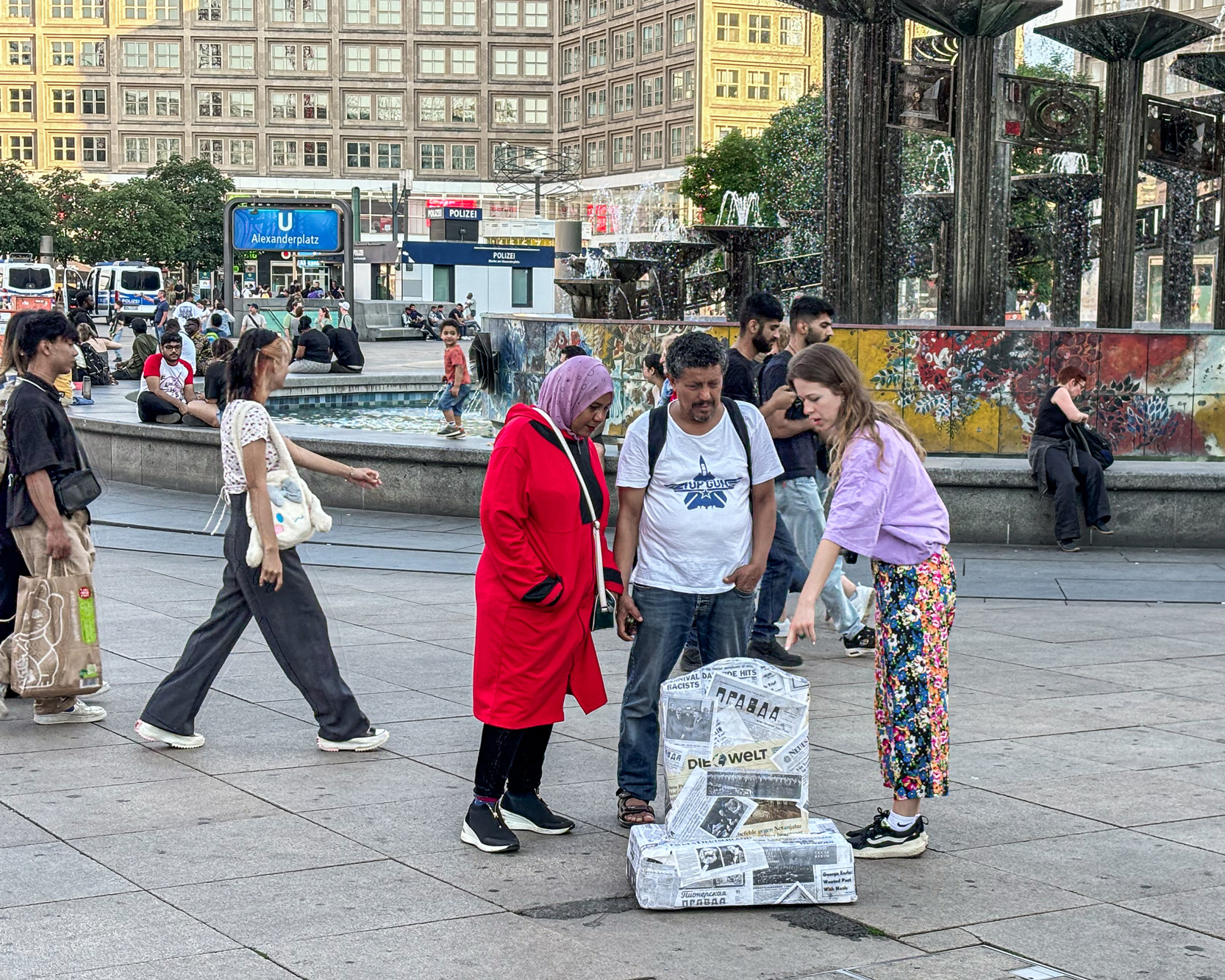
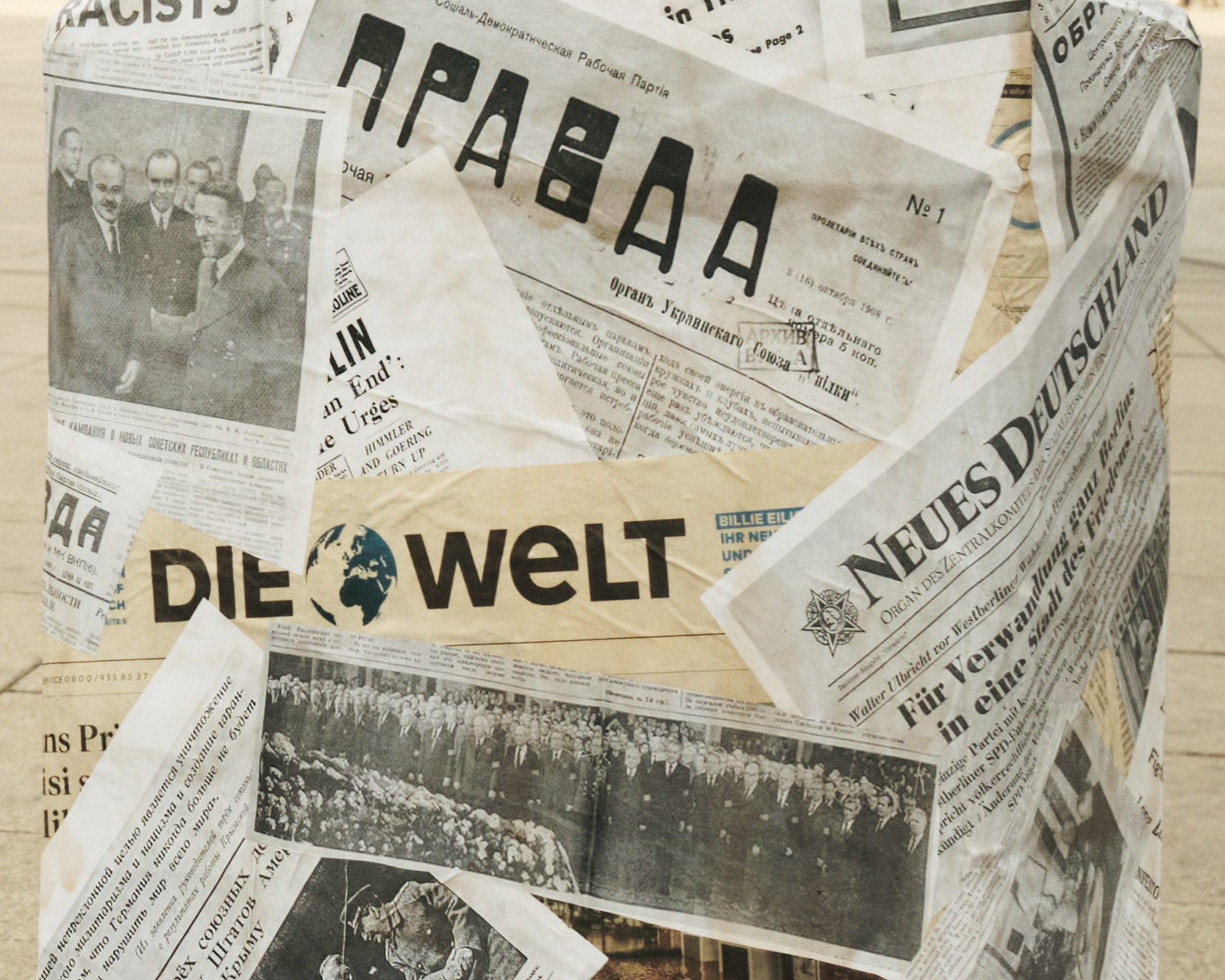
ПРАВДА [pravda] / in GOD we TRUST
The central newspaper of the Soviet Empire was titled PRAVDA. This word is different and even opposed to the word “Truth” in russian culture.
The russian Contemporary Dictionary of Philosophy reflects on this distinction: PRAVDA, unlike Truth, has an ontological character: it reflects reality in a meaningful way for the individual, in agreement with moral categories and in such completeness as is necessary for true understanding and conviction, determination to act. Thus, if Truth corresponds to the objective actually experienced reality, PRAVDA is the highest spiritual, divine reality.
The Soviet Marxist socialist newspaper, named PRAVDA and claiming only one true Truth for all, carried the meaning of divine righteousness. Cracks in media façades, on democratic fences, on corrupt archives labeled "knowledge". Amen, Soviet Marxists ✞
Truth has its own translations in other languages, over 136 articles in different languages are devoted to this phenomenon on Wikipedia. And only 2 articles are devoted to PRAVDA — in russian and slovenian. We took german and english: TRUTH and WAHRHEIT, because the object is made mainly from the archive of socialist newspapers published in the Russian-Soviet Empire (RSE), GDR-DDR, UK and USA.
The current situation with the pro-Palestinian protests in front of Axel Springer SE’s golden building in Berlin shows that the crack that has long passed through major media has only widened.
On the fence next to the abandoned RAVDA newspaper editorial office building in Moscow, graffiti lived for some time:
PRAVDA [~truth~] no longer lives here
Façade or Façades?
Structures are visible through the façade. Even before the system self-explodes under the pressure of its destructive patriarchal-colonial values. And the danger of this sophisticated wrapping of obscene structural values is that these façades are many, and they are not the subject of historical debate, but an actively used tool in the here and now. One of them is Dugin-Putin’s decolonial façade, which is a continuation of the USSR’s façade tradition of promoting one thing, doing another (peace is war). More on this in Miri Davidson’s text Decolonialism of the Far Right. In Berlin, cracks have spread across the democratic façade against the backdrop of the genocide in Palestine carried out by Israel with the support of the US and Germany. The democratic façade still shines and promises “gardens for gardeners”, but inside, the democratic rights to freedom of speech, freedom of assembly, and respect for human rights have already disappeared. Clearly, we are living in the reality of violent power relations hiding behind beautiful false façades. The basic background of the Berliner (both on the street and in the swipe) is police hyper-violence.
Fanon, Foucault wake up! What Is To Be Done?
Another skyscraper is being built on Alexanderplatz with the money of a French company that owns a huge amount of real estate in Berlin, whose rental prices were jacked sky-high not too long ago. A couple of years ago they drilled Alexanderplatz so much that they punched a subway tunnel underneath it. The U-bahn U2 line is still being repaired. And in Berlin there was a meme going around “Erst U-Bahn absenken und dann Miete erhöhen!” [First down the U-Bahn and then raise the rent!]. There is a fence around this construction site in the square named after the russian colonizer, which has a “street art curator.” In order for Berliners not to worry about the discomfort of non-working public transportation, Covivio pays for beautiful pictures on the fence. A little farther away, another skyscraper is being built with money from the russian company Monarch. Do you see the irony here? On the square in Berlin, which is named after the Russian colonizer Emperor Alexander I, the Monarch company is building a giant building. Soon there will be a Monarch on the Imperial square. Berlin, how much colonial grandeur do you need? And there are fences around the construction sites, on which the "street art curator" forbids the street art to appear, she erases it and tapes it up with texts thanking french money. Last week that fence became suddenly a crack. A multi-meter curved crack crossed the prosperous façade of Alexanderplatz. Now it’s the site for pro-Palestinian demonstrations, space of the Open Air Museum of Decoloniality, and rooms for critical art.
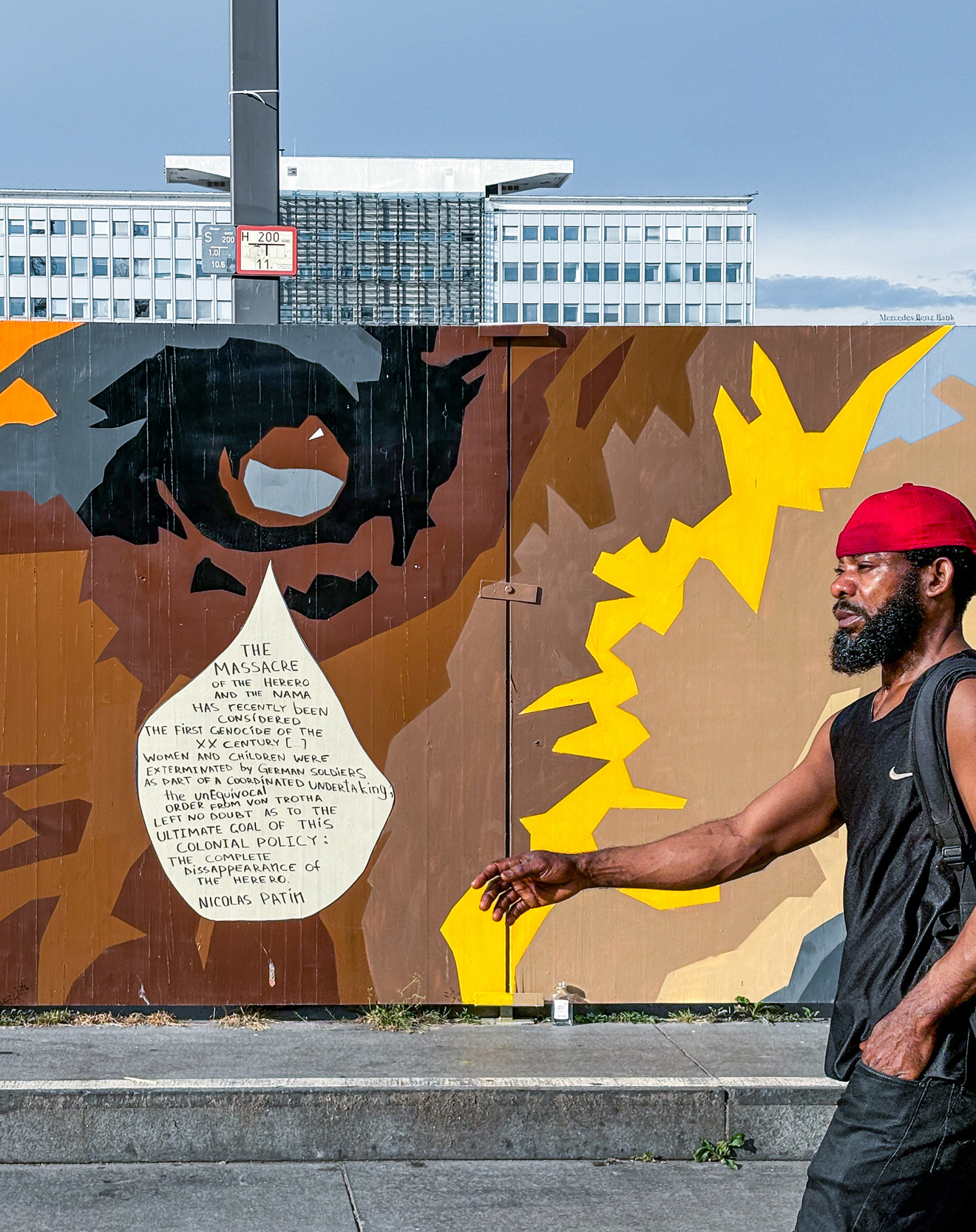
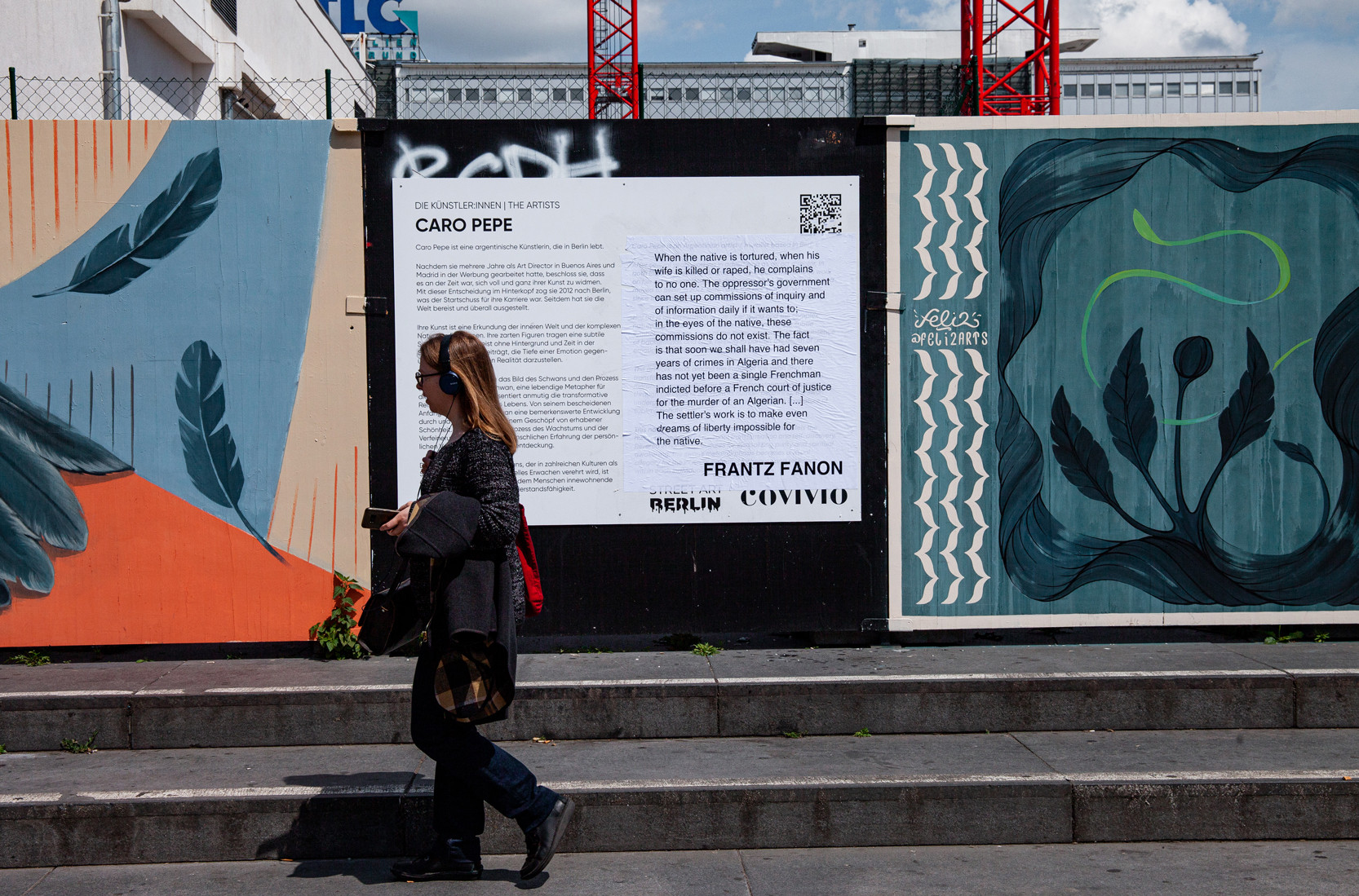
UN-FENCE is a wonderful example of publishing free knowledges. The fence could be a handbook.
As far as is known, one version of the name of this fence contained the Greek prefix of negation “A” — A-FENCE. To deny the existence of an existing fence is a gesture of wide-closed eyes. At the same time, decorating the fence is an act of gentrification, working to increase the capital in this case of the french developer’s company. At the same time, the fence is a curated project only available for the selected murals by so-called streetart-curator of the self-denying fence. An elite fence for elite "street art" in Berlin. A project that is worthy of Munich!
And where is this fence located? Right on the square named after the russian-emperor-colonizer Alexander I. And this is apparently well understood by the authors of the second layer on this fence. There are quotes from decolonial feminist native activists, researchers and scholars who make visible German, French, Russian-Soviet colonialisms and link colonial relations to contemporary social problems and ecological crises.
This is an eye-opening publication that turns the fence (un_fence!) into a learning book on the problems of the present day. As the protesters at Humboldt University correctly pointed out — german academia completely ignores german colonial history and something should be done about it. Like founding a Jabalia Institute or publishing books right on fences and streets and making self-education available right in the public square, for instance. Cracks are run through façades, fences, elite archives and institutions and in these cracks are inhabited by free voices <
Part 2. Power of Erotics
We can only move from perfect passion to perfect love when the illusions pass and we are able to use the energy and intensity generated by intense, overwhelming, erotic bonding to heighten self-discovery.
― bell hooks
Desire, AI, and Public Intimacy
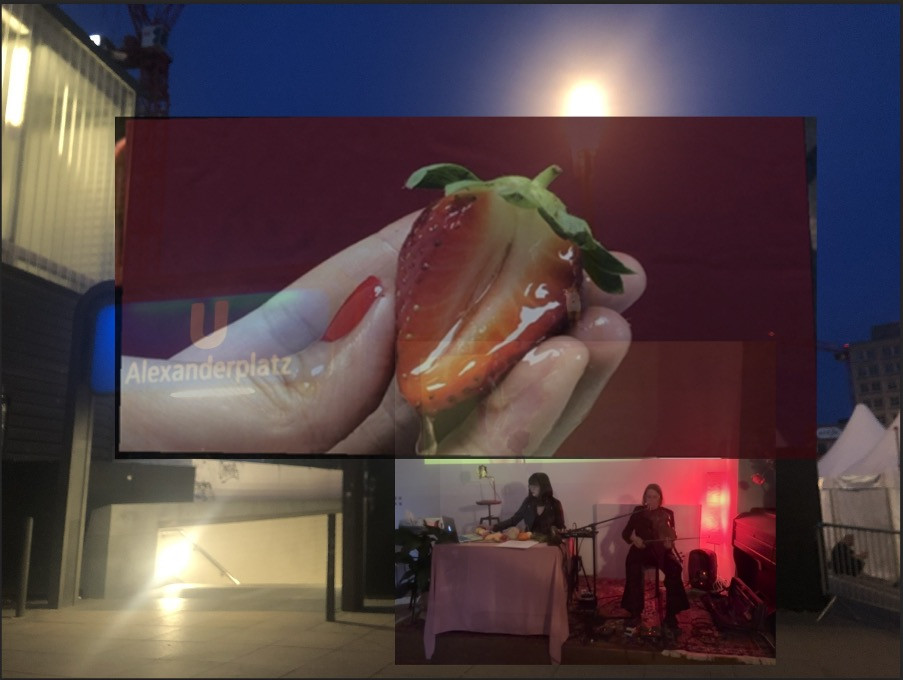
This practice-led research engages with the fields of psychology, politics, philosophy, sexuality, and fine art. It critically examines the use of sexuality in the production of artwork by specifically considering evolutionary psychology’s theory of supernormal stimuli and eroticism, to potentially combat or disrupt political repression. The research further questions if the use of supernormal stimuli could subversively reveal issues and even reshape the existing social-political and cultural issues such as censorship and post-colonialism in public space physically and digitally.
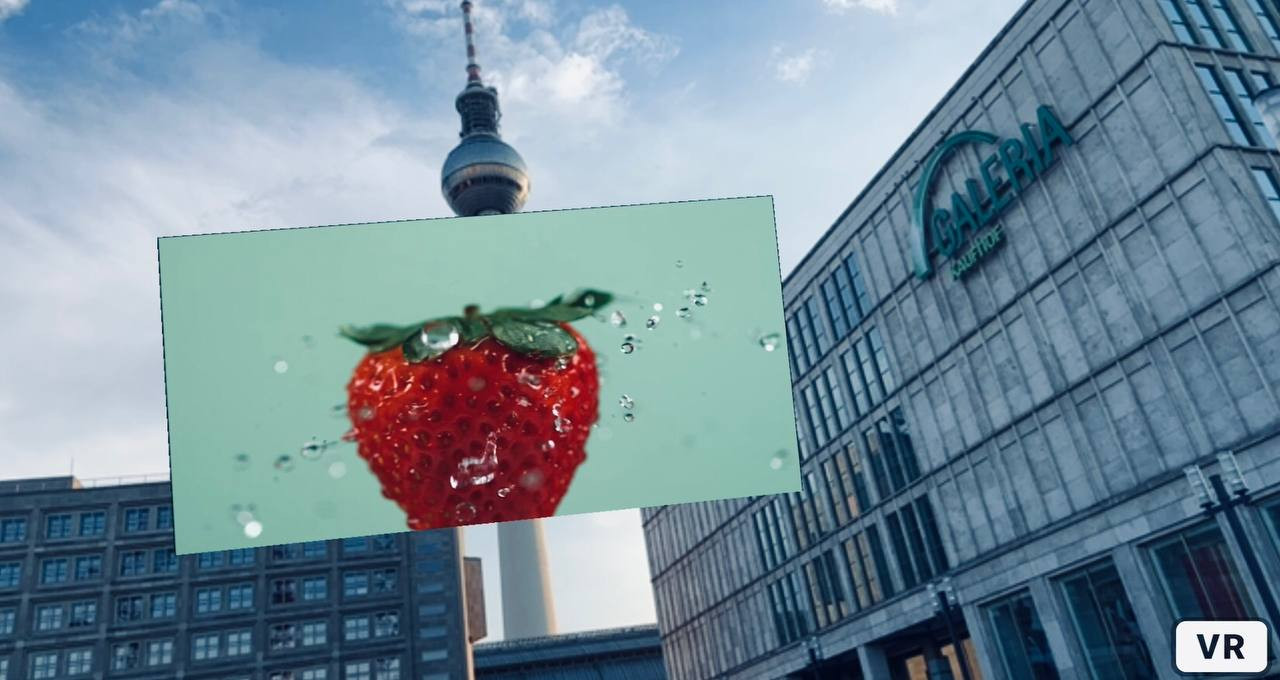
When shown in a public space like Alexanderplatz, Augmented Reality Interface Erotic Poetics invites the viewers to scan the location-based GPS QR code and interact with short clips of videos within the background of the public space of Alexanderplatz and Friendship Fountain. During the performance, by creating a close electricity circuit between my body, non-human agency and my computer, each touch of my finger generates a different note and pitch. Accompanied by reading, the touching of clay sculptures, and improvisation of my collaborator Jess Aszodi’s singing, the entire performance engages with different media between sound, objects, electronic circuit, augmented reality with an emphasis on using eroticism counteracting the censorship and repressive political regime.
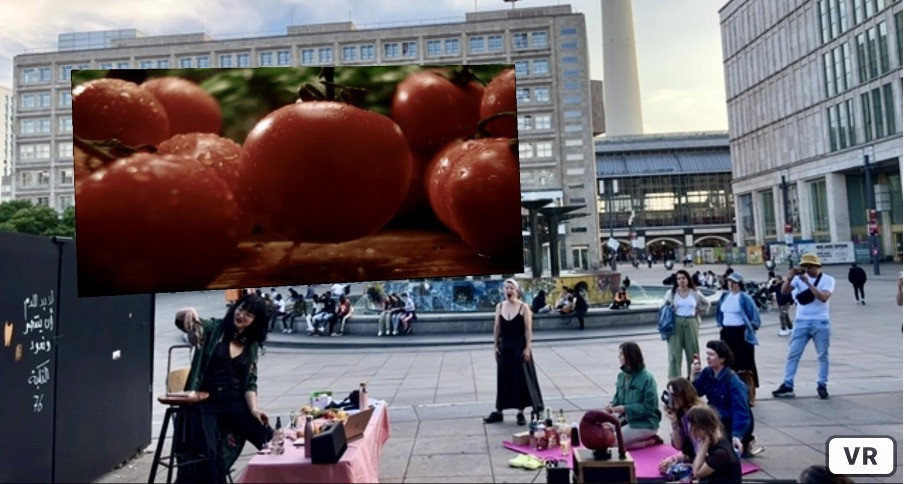
Alexander Platz is a public space that is highly controlled with many surveillance cameras and strict police controls. The use of supernormal stimuli and eroticism in the production of film, sound, and performance, aims to bring sensuousness back to the public space. By inviting the audience to scan the QR code and interact with the Augmented Reality Interface, the public is also invited to take screenshots of the performance within the public space together with the background of the Friendship Fountain, which symbolizes the friendship between soviet and GDR. By uploading the screenshots and screen recording of the performance and Augmented Reality onto a project account. The feeding of the information collected from the public engagement, for this project, attempts to disrupt and even counteract the hegemonic surveillance regime of Alexander Platz and the biased information system.
Meanwhile, I attach the forearm of the audience and invite one of the audience to interact with an ECG heartrate interactive sculpture communicated by bluetooth reader. The kinetic sculpture is activated by the change of heartbeat from the audience while watching my performance within a public space. The movement of this ECG heartrate sculpture indicates the change of bodily affect evoked by the artwork, which potentially provokes physiological responsiveness and thought to be provoked.
Supernormal stimuli hijack people’s attention subconsciously. The reception of such hijacking stimulations activates bodily affect from non-symbolic representation level during the encounter of artworks. Non-symbolic representation and non-linguistic bodily affect evoked from Supernormal stimuli induce the physiological and involuntary bodily responsiveness and mechanism. The feedback from the audience’s perception of physiological responsiveness, such as heartrate, temperature, skin conduciveness level, facial recognition, temperature, organ and physiological change, etc. Such non-symbolic representation at the physiological level of bodily affect is collected by my sculpture Book of Disquiet, the feedback of the audience from their corporal responsiveness is engaging with the public space during the performance Desire, AI and Public Intimacy.
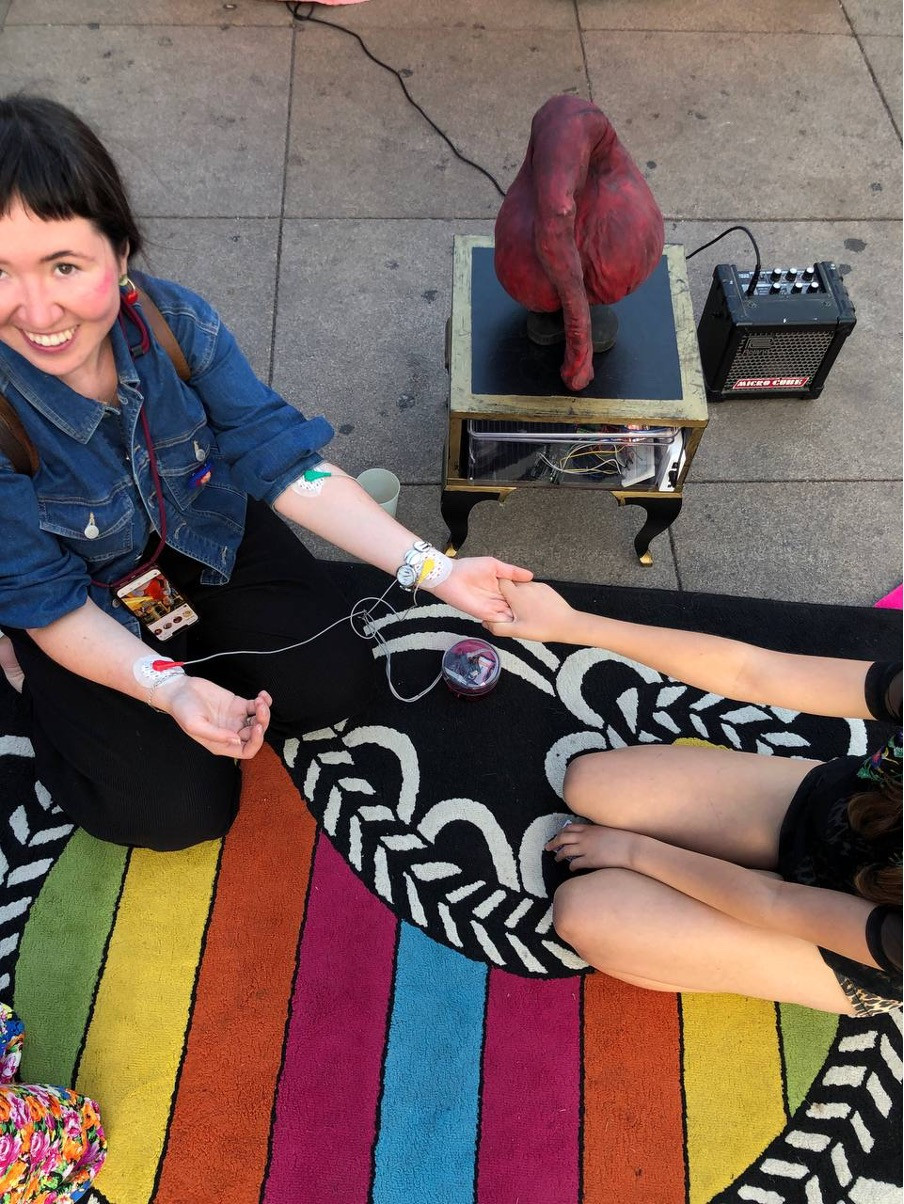
This performance as part of my practice-led research aims to empower politically repressed communities to express their silenced voice and uses eroticism in the production of art counteracting the repressive regime of a totalitarian political system. In today’s digital landscape, AI and information systems shape perceptions and worldviews, often reinforcing stereotypes. Urgent and pressing, my research confronts this issue by addressing the customization of information feeds that intensify stereotypes. This practice-led research proposes that the use of affect evoked from eroticism, supernormal stimuli and non-symbolic bodily affect in the production of artmaking and art-viewing behaves as a semi-penetrable skin that interferes and influences different realities. Within the physical space at Alexander Platz, people are experiencing both police control and artistic liberation from my works, and my performance attempts to give form to unknown desires and to encourage people to be aware of their repressed feelings; digitally, the public is shaped by customized information feed, but in the way of feeding back to the big data feed, it potentially disrupt and counteract the big data subversively.
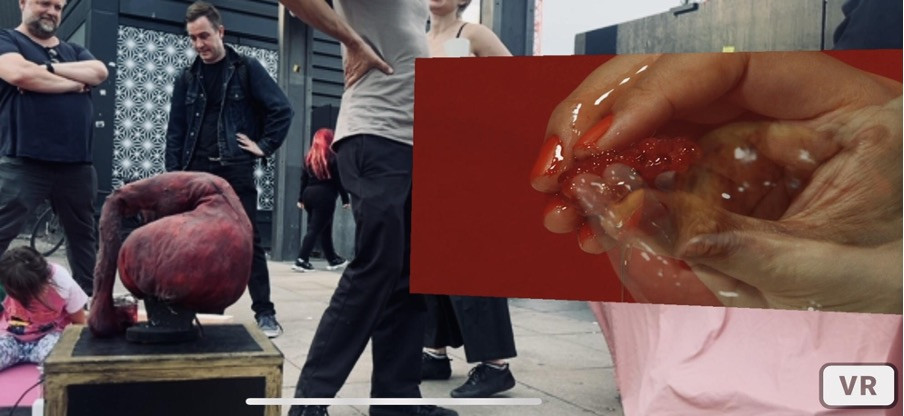
By incorporating non-human intelligence in relation to the non-symbolic representation of bodily affect and a de-colonial approach in relation to eroticism can significantly contribute to counteracting biased AI systems. By expanding the biased AI from a binary flat surface towards Multidimensional spatial existence with many faces of AI-generated technologies, accompanied by the impact of non-human intelligence, affect and decolonial perspective. This project aims to allow different human and non-human agency and multi-cultural meaning representations to co-exist and involves a multi-faceted approach that touches on ethical, methodological, and cultural aspects. As a result, it together creates a more ethical, inclusive, and unbiased AI landscape.
Dr. Chang Gao’s research proposes that the energy induced from this desire represents an individual’s specific status and position, which could potentially unlock a hidden subterranean layer of bodily affect. This could allow politically repressed voices to be heard as a result of the bodily affects. The recursivity of the information (info-reception-info) fosters the emergence of contingency, expressed through art, it gives form to submerged, repressed or even unknown desires and allows an opportunity to articulate these in public space. In this sense it is unleashing and it offers more than a feeling of fantasy. While the sense of being excluded from the public sphere is also acknowledged, this project aims to create an expression that could go under the radar of a government’s control of representation and data surveillance.
Eroticism in Audre Lorde’s sense operates as a decolonial strategy. It collides with desire, fantasy, imagination, and affection, which challenge the dominant narratives and power structures that as a result, influence AI development. By centering marginalized voices and critiquing historical biases embedded in AI systems, a decolonial approach from eroticism input can help disrupt the status quo and advocate for more equitable and just technological solutions. Since eroticism is situated in everyone, its emphasizing decolonization can lead to the creation of AI systems that are more reflective of diverse perspectives and values, and which seek to counteract the patriarchal, hegemonic, post-colonial and anti-erotic world.
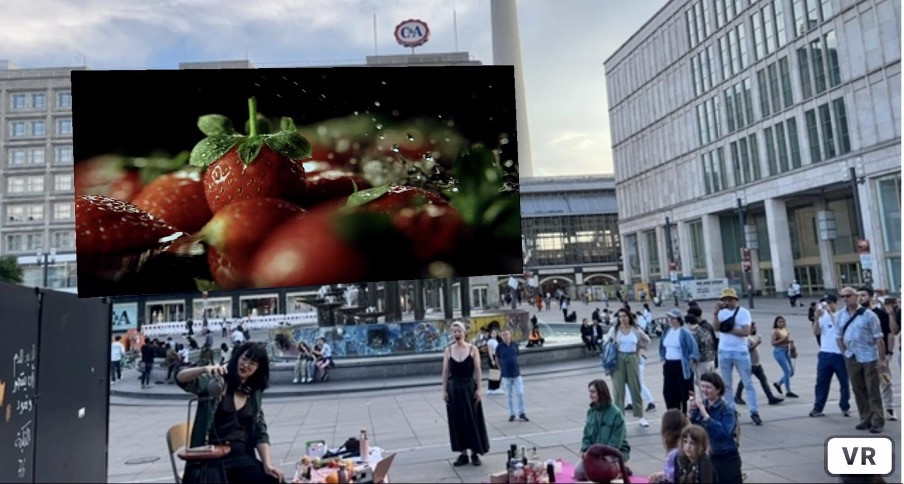
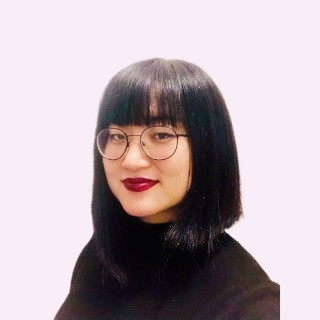
Berlin and London based Artist, Lecturer at University of Art London, Postdoc candidate currently working at Berlin Free University, Doctor at Royal College of Art, Public Art Researcher at Public Art Research Centre of China, Director and Establisher of Social Innovation Research Lab at Central Academy of Fine Art. She is a visual artist using multiple media in her practice production, such as sculpture, robotics, AR interface, film, photography, hologram installation etc. Chang recently obtained her PhD degree at Royal College of Art in London. This research uses eroticism and supernormal stimuli in art making, derived from evolutionary psychology, which evokes the audience’s desire regardless of racial, cultural, gender or individual differences. It contends that the energy induced from this desire represents people’s particular status and position, which serves as a subversive tool to reveal the issues within postcolonialism and consumerism. The “organism-world relationship” developed from her research practice could potentially disrupt and even potentially disrupt and even reshape the existing social-political and cultural issues such as cultural hegemony and post-coloniality in public space.
She gave a Ted Talk on May 23rd, 2016 and presented her PhD topic at many research conferences at Freie Univeristy Berlin, Universität der Kunst Berlin, IKSK Berlin, Royal Central School of Speech and Drama twice, IEEE Sentimental Robotics and Automation Conference, and many other symposuims. She has shown her works internationally, in Berlin Kunstverein Rosaluxemburg Platz, KSTN project space, Utrecht Netherland, Gras Steirischer Herbst Austria, London galleries like London Art Biennale, Beaconsfield Gallery, The Cript Gallery, Copeland gallery, Royal Central School of Speech and Drama, Dyson Gallery at the Royal College of Art, London Southwark Park Gallery, and many other galleries in London, Korean Collage of Fine Arts at Hongik University in Seoul, together with Japan Tama University and Alto University, Helsinki and many museums and galleries in China. She also held her PhD Solo exhibition: Intimate Fantasy at Royal College of Art.
Dr. Chang Gao: Instagram ― e-mail gao.chang@network.rca.ac.uk ― personal website ― RCA Research Page
